
Categories
Resource Types
CCSS
Speaking & Listening
Language
Reading
YOU are Driving Your Brain! Listening for Unknown Words & Asking Questions as Self Advocacy
$ 895
Information for teacher about development of metacognitive skills and students' ability to recognize unfamiliar words. Materials to support discussions about what we know and don't know, recognizing u
...
nknown words and deciding when and how to ask for an explanation. Includes 5 activities. Vocabulary-loaded text provided, on the topic of environmental concerns. Graphics, word map, desk cards with language of asking for explanation. Suggestions for differentiation.
Listening Challenge: Understanding the Message & Making polite Requests
$ 195
Students discuss situations that create listening challenges, discuss strategies and polite requests that can address the problem. An all-purpose game board, worksheets and teacher script creating com
...
munication breakdown are provided to facilitate practice.
Listening Skills - Forming Word Relationships through Listening
$ 0
Auditory discrimination plays a large part in listening comprehension. These listening strategies and activities can be used to practice auditory and listening skills. Includes recognizing same and d
...
ifferent, number of sounds and syllables, word association, listening comprehension, and listening for fact or opinion.
Listening Skills - Instructional Strategies - Listening
$ 2
There are 3 main types of listening: 1) informational; 2) critical; and 3) empathetic. These listening strategies can be used to introduce or reinforce recognizing fact or opinion, responding to "Wha
...
t would you do if…?" questions, and making choices based on personal preference and experience.
Listening Skills - Instructional Strategies - Hierarchy of Listening (Discriminating Minimal Pairs)
$ 3
These activities focus on the hierarchy of auditory development beginning with the easiest- detection- then moving to attention, localization, discrimination, identification, and finally comprehension
...
. Activities include discriminating same and different; discriminating minimal pairs, sounds dominoes; and creating rhymes.
Listening Skills - Parallels of Audition and Speech Development : Summary
$ 0
This informative chart includes the developmental parallels between audition and speech.
Listening Skills - Sounds as Symbols - Onomatopoeia
$ 195
These instructional strategies and activities address sound words or onomatopoeia. Words are used in literature to more precisely describe sounds such as human voices, animal noises, and environmental
...
sounds. Consider the differences in a growl and a hiss; a giggle and a belch; a splash and a spray; a clang and a thud. You will find strategies for teaching such words and a sound bingo game that can be used with beginning and more advanced listeners.
Listening Skills - Copy What I Say
$ 195
Listening and following directions are important skills that require practice. Activities for listening accuracy include Copy what I Say which will help to reveal listening strengths and needs and f
...
ollowing precise directions to create a picture.
Listening Skills - comprehension (Introduction)
$ 295
Listening comprehension is more than just hearing a sound or what is said. It is the understanding of the message. This includes awareness of the meaning and language structure of the words used as we
...
ll as the meaning derived from tone of voice, phrasing, rhythm, and inflection. Good listening comprehension is important for reading comprehension and for verbal and written expression of thoughts and feelings. Activities include Listen and Do, Listen and Use, prediction, labeling, and listening for details.
Listening Skills - Listening for Past, Present, Future
$ 195
In reality, time is a recognition of order, duration, and pattern. It is an important part of the executive functioning skills of planning and prioritizing. As a child ages, the cognitive skills neede
...
d to conceptualize time move from an awareness of ‘now and not now’ to an understanding of past, present, and future. These instructional strategies include matching correct spoken sentence with picture; using a three section calendar for past,present, and future associations; and using verb tenses for clarity.

 Your browser is out of date. For best experience switch to latest updated Browser.
Your browser is out of date. For best experience switch to latest updated Browser.
 Get Chrome
Get Chrome Get Edge
Get Edge Get Firefox
Get Firefox
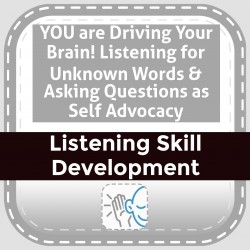
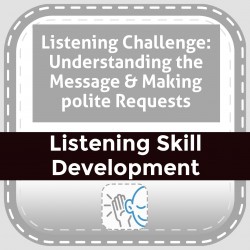
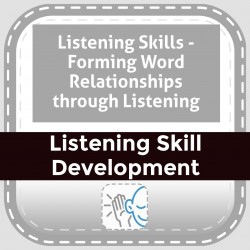
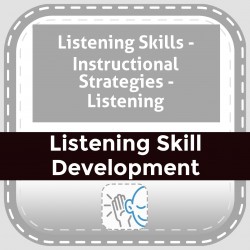
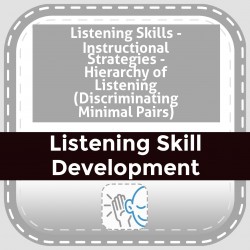
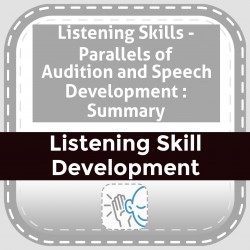
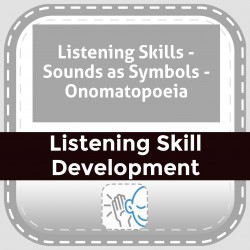
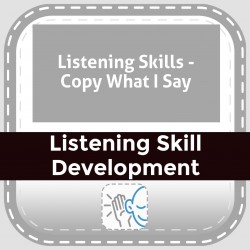
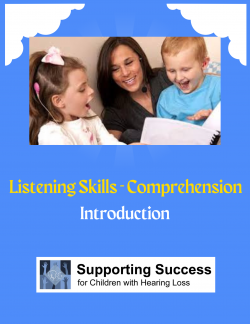
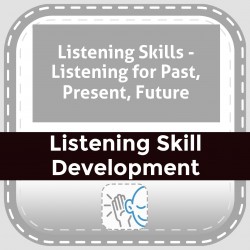


 You MUST include an email contact and phone number on your PO. Some of our products are downloadable only and delivered via email. Not including an email address will prevent delivery.
You MUST include an email contact and phone number on your PO. Some of our products are downloadable only and delivered via email. Not including an email address will prevent delivery. 